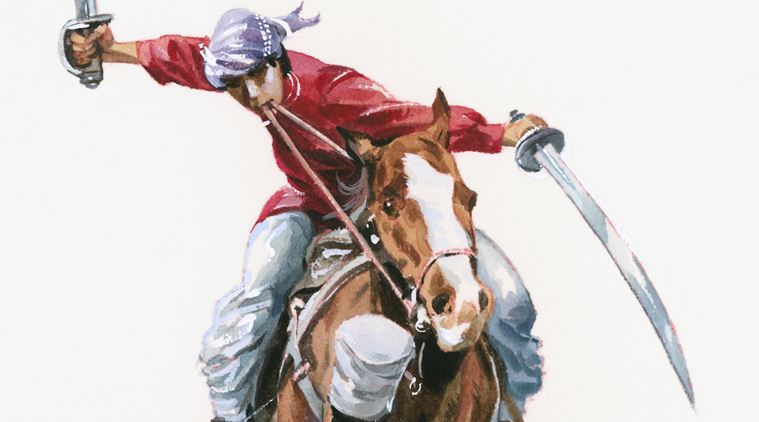Manikarnika: When little Rani Lakshmibai asked, ‘If a boy can do it, why can’t I?’
As Manu grew older, she became a skillful horse-rider. She also learnt to use weapons. She didn’t know it at the time but, later in her life, these skills would become very useful to her.

By Sonia Mehta
The little girl was nowhere to be found. Her aunt had searched for her everywhere. There were peas to be shelled, rice to be cleaned and a lot of housework waiting to be completed.
Suddenly, the aunt heard the little girl’s voice wafting from the street outside. She looked out of the window and saw the child playing seven tiles with some boys.
‘Manu!’ her aunt called. ‘Come in at once. There is much work to be done in the house.’
‘I won’t,’ the girl replied defiantly. ‘I want to play. Why should I have to work while my friends play outside?’
Her aunt didn’t know then—and nor did the girl’s poor unsuspecting father—that the motherless young girl would grow up to become Rani Lakshmibai, the queen of Jhansi. She would become famous all over the world for her bravery and for the way she fought for her kingdom against an entire army of British soldiers.
Fearless Manu
Rani Lakshmibai wasn’t born a princess. In fact, she was born in a simple Brahmin family. Her father’s name was Moropant Tambe and her mother was Bhagirathi Bai. People are not sure about exactly which year she was born, but it was probably around 1827, in Kashi (now the city of Varanasi), and she was named Manikarnika. But everyone knew her as Manu.
When Rani Lakshmibai was a little girl, she was a complete tomboy. She didn’t behave like other little girls. Instead of playing with dolls, she loved to run around and play all kinds of outdoor games. Her dearest wish was to ride an elephant—like she had seen men do. She was quite fearless when it came to trying out new things.
Did You Know?
Manikarnika means one with jewelled ears. It is also the name of a river in India.
Her father loved her very much and let her do as she wished. Perhaps this was because she had lost her mother when she was only two years old and had no one to teach her all the things that girls of that time had to know. Instead, little Manu grew up insisting on learning to do everything that boys and men did.
‘Manu, this is not how girls behave,’ Moropant would reason with her when she wanted to try something that was dangerous.
‘But, Baba,’ she would argue, ‘if a boy can do it, why can’t I?’
Poor Moropant would have no answer to this and would give in, allowing her to do exactly as she pleased.
Oh Really?
Moropant Tambe worked as an adviser to the Peshwa’s younger brother. He had a salary of Rs 50 a month. Imagine that!
In those days, it was not common for girls to go to school and study. But not only did Manu learn to read and write in Sanskrit—for she loved reading—she also learnt a little bit of Persian. This made her a very confident young girl and she was never afraid of expressing her views to people.
Even though she was not quite eight years old, she was very independent and would insist on doing everything herself.
The Adventurous Threesome
Soon after the death of Manu’s mother, Moropant had moved from Kashi to a town called Bithur.
The Peshwas had a large following in Bithur and were the leaders of the Maharashtrian community, playing the role of prime minister as well as the chief of the army.
The boy who was chosen to be the then Peshwa’s successor was called Nana Sahib. Nana Sahib was more than ten years older than Manu, but she became great friends with him. From Nana Sahib she learnt horse riding, fencing and even a sport called mallakhamb. Tantia Tope was another young man who was Manu’s buddy, though he too was much older than her. The three of them became a familiar sight around town, getting up to all sorts of adventurous antics together.
As Manu grew older, she became a skilful horse rider. She also learnt to use weapons. She didn’t know it at the time but, later in her life, these skills would become very useful to her.
The Peshwa and Manu
Peshwa Baji Rao II would see little Manu running around and making friends with everyone. Wherever Manu went, she would make people smile. The old Peshwa was so fond of her that he nicknamed her Chhabeeli, meaning playful.
Once when Nana Sahib was riding an elephant, Manu insisted on riding one too. When her father forbade her, she sulked and threw a tantrum.
She swore that some day she would ride ten elephants!
(Excerpted with permission from Rani Lakshmibai: Junior Lives by Sonia Mehta, published by Puffin Books.)
Source: Read Full Article